Talent to thrive: inspiring cultural change
Continuing an extraordinary year of progression, on December 1, 2022, Consalia hosted its 17th annual Global Sales Transformation Event at the London Stock Exchange. Sales leaders from top companies such as BT, SAP and Vodafone were in attendance to network and learn from each other, but most of all discover how companies could best attract, engage and retain young sales talent. Sessions were held throughout the day and hosted by sales leaders who presented their evidence on the day’s theme through collected data and first-hand experience.
This was also the first GST to take place with no delays after the global pandemic.
The theme of this year’s event was “Talent to Thrive: Inspiring Cultural Change” with an underpinned question of how to attract, engage and retain young sales talent. Featuring knowledgeable guest speakers and panellists from leading companies such as UCAS, Sharp, and BT guests gained valuable insight into this year's topic, and how it would further benefit sales teams and individual professional development, as well as the sales profession as a whole.

The agenda included:
- Louise Sutton, Consalia Academy Director and Patrick Joiner, Managing Director of the Institute of Sales Professionals discuss - "The state of sales apprenticeships”
- Katie Bell, Chief Marketing Officer at UCAS discuss - "Sales as a career: UCAS discuss student sentiment”
- Nick Rose, Sales Director at Sharp - How to embed a sales academy at an organisation
- Simon Wheeler, Account Executive - Transport at Salesforce - Reducing sales attrition through vision and coaching
- Jo Hillman, Senior Sales Director at CWT presenting her session on how to engage a salesforce through times of unprecedented change
- Group Panel of professionals - Jason Holt, Co-Founder of Metaverse Learning Metaverse, Sherry Nematalla, Global Accounts Manager at Vodafone, Kevin Kelly, Managing Director at PACE, and Pete Milsom, Partnerships Manager – Apprenticeships at UCAS discussing their learnings on attracting, engaging and retaining sales talent through apprenticeships

The State of Sales Apprenticeships
Leading the first session of the day was Louise Sutton, Academy Director at Consalia and Patrick Joiner, Managing Director of the Institute of Sales Professionals.
Leading their presentation on sales apprenticeships, they shared valuable knowledge regarding apprenticeships that included:
- What they have noticed about sales apprenticeship programmes in the past year
- Why the higher sales apprenticeship programmes work well
- What the next steps for apprenticeship programmes in the UK might be
The reason why the apprenticeship programmes work well, is due to their well constructed path of progression. Across the board, from Level 3 through to Level 7, there is a clear path for salespeople to progress in their careers after a salesperson completes their programme - Roles were in regard to Sales Executives, B2B Sales Professionals and Senior Sales Leaders.
Individuals can fill the gaps in their knowledge, learn the right skills they need for their next role and more, all while having the ability to immediately put what they have learned into practice. These are just a few methods that have proven to work.
When it came to young people starting their careers in 2020/21, those under nineteen accounted for 22.2% of the 2,881,900 apprenticeship participants. This total number, however, did not reach the estimated target and showed that there is a disconnect or lack of awareness about the apprenticeships available for young people. Furthermore, according to a recently published report by UVAC and CMI, evidence shows that management apprentices are adding £700m a year to the economy. But why are numbers still lower than expected?
“The lack of investment in the skills needed for the future is undoubtedly a key factor in our level of productivity” Louis Sutton, Academy Director, Consalia.
The challenge of attracting and recruiting sales apprentices
Other than perhaps a need for more financial support, it is also apparent that there are a few underlying hurdles that add to the challenge of recruiting early careers sales talent. According to Louise, sales not being considered a career choice for school leavers and graduates, and the negative reputation of sales is an example of these additional hurdles.
“Sales is inadequately represented in business education. Even when people are going in to do a Business Studies A level or Business Studies Degree, very rarely do you see even a module on sales… which is madness because almost all of those graduates are going to spend at least some time in sales when they graduate."
"The negative representational legacy that sales has, is because they (students) don’t hear about it in school. It’s not positioned as a profession. The only exposure to sales is those ridiculously stereotyped tropes we see in the media or in comedy shows on TV about the negative impression of selling. Nobody is actually communicating the centrality that sales has to play” - Patrick Joiner, Managing Director of the Institute of Sales Professionals.
People are unaware of what sales apprentice programmes are or the benefits students gain from them. Additionally, there is a lack of knowledge regarding apprenticeships within high-level occupations in education. Because of this, it is unlikely for teachers in secondary schools to inform or encourage the apprenticeship pathway to their students.
To end the session, Louise and Patrick called for the graduates themselves and those who know the benefits of the sales programmes to “promote sales as a contemporary profession and promote sales apprenticeships”.
To promote sales as a pathway and be ambassadors of the programme, this word-of-mouth way of promotion will cause a buzz and curiosity, which in turn may increase the number of apprenticeship students in the future.

Sales as a career: UCAS discusses student sentiment
Katie Bell, Chief Marketing Officer at UCAS, was next to deliver her findings on sales apprenticeships through the eyes of UCAS.
“Almost 75% of kids applying for university are also interested in apprenticeship”
UCAS is not only popular among young people, but one of the leading platforms students use when they are looking to take the next step in their education. It is a gateway students take when striving for higher education, with access to over 1 million students per year, providing them with the reach and support they need to take the next step in their journey.
According to research found by UCAS, the reasons students go into sales are:
- To develop the essential skills needed in their career (62%)
- To earn more money in the future (58%)
- To help get a better job in the future (54%)
- To help figure out what they want to do with their life (33%)
Every company has a sales department, so why aren’t people willingly going into sales as a career and instead “landing in the sales”?
Ending her session, Katie Bell made it clear that it is important to raise the profile of sales. A change in the way sales is seen and talked about needs to be thought about in order to better promote the sales industry and lessen sales vacancies within organisations.
The audience was left with a few questions:
- How can we change the image of sales from an earlier age all the way through?
- How can we fill the 50,000 vacancies?
- How can we encourage more students and mature people to think about the skills they bring, as well as the knowledge that they need?
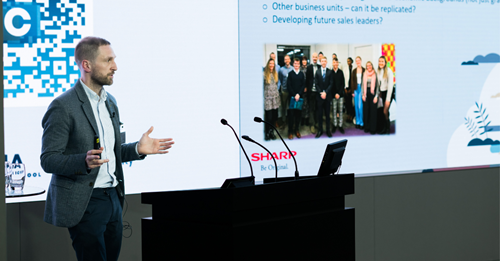
Embedding a Sales Academy within Sharp
Third session - Nick Rose, Regional Sales Director, Sharp UK is one of Consalia’s proud graduates from the Master's programme. Currently embedding a Sales Academy within Sharp following his final year presentation on the topic, Nick shared his findings from his research leading to the development of the sales academy within the business. Below are the results of a shared survey that was based on the first 6 weeks of employment.

Following the results of the survey, Nick shared with the audience the recommendations he brought to the business and Senior Leadership Team to combat what he saw as blockers that prevented the best results:
- Plan and communicate in advance and deliver on expectations of a global brand
- Onboarding cohorts instead of individual onboarding. This would be more efficient and harnesses the power of a team
- Separate ‘generic induction’ from sales onboarding process - promote sales content and keep it ‘front and centre’
- Involving the Leading and Development Manager in all UK-wide sales onboarding to ensure consistency whilst also enabling autonomy across regions
- Content overhaul – write a program that will speed up time to competency by focusing on the areas that matter the most while embedding understanding around the business’s values
- Embedding a mentor/buddy system to harness the power of peer-to-peer learning
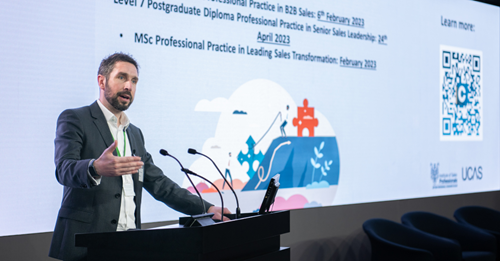
Reducing sales attrition through vision and coaching
Can Vision and Coaching be combined as a strategy to reduce the attrition of sales professionals in the background of “the Great Resignation”? Simon Wheeler, Account Executive - Transport at Salesforce, held his session addressing this very important question.
It is no news that the current economy is going through massive changes and will continue to do so. With these economic changes also comes a shift in thinking in regard to employers and those looking to start or continue their careers.
Employees are demanding more from their current and potential employers (Stack, 2021, p. 63).
Through various interviews for his research, Simon discovered that young workers no longer want to work for companies just to make money, they want to work for a brand or people they believe in. They want to feel as though their work is making a difference. With that being said, according to Simon’s research:
- Retention is topping the priority lists
- A majority of workers who quit their jobs in 2021 cited low pay, no opportunities for growth and feelings disrespected
- Toxic culture is driving the Great Resignation and more…
So again the question stands, can vision and coaching be combined as a strategy to reduce attrition of sales professionals in the backdrop of "The Great Resignation"?
With such negative results, Simon shared that in order to even attract potential salespeople to a career in sales, it is very important for companies to carefully pay close attention to what their employees need. This includes proper recognition for their work, a path to professional growth, and a healthy balance of work.
Simon also introduced his V2GROW – A Conceptual Coaching Method. A modified method of Sir John Whitmore’s Grow Method, V2GROW aims to create deep engagement with salespeople while also addressing concerns, such as lack of development and growth opportunity.
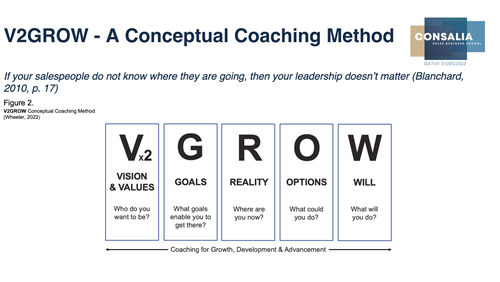
Unlike the original Grow Method, the V2GROW introduces forward thinking and extends the coaching perspective. With this, the method leans more toward growth, development and career advancement.
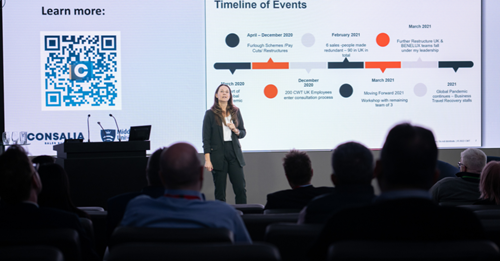
How To Keep A Salesforce Engaged At A Time of Unprecedented Change vs Transition
“Change is situational – transition is psychological and can be a 3 phase process that we all go through as we internalise and come to terms with details of the new situation that the change brings about”, Jo Hillman, Head of Sales UK and BENELUX.
There couldn’t have been a better spokesperson at GST XVII to speak on unprecedented change than Jo Hillman.
Jo had the unique experience of going through her master's programme while the world was manoeuvring through the pandemic. Working in travel, her industry undoubtedly experienced much change as flights and airlines began to halt all travel.
Crediting her learnings from the master's programme, Jo advocated that she was able to directly apply what she learned to her role immediately. This experience led her to the “Three Phases of Transition”:
- Phase 1 – Ending, Losing, Letting Go - transition is an ending and when we need to help each other with what we have lost.
- Phase 2 – Neutral Zone –need to readjust and accept mentally and think about what it means to us.
- Phase 3 – New Beginning - developing our new identity as a team, new energy and sense of purpose.
After having lost a majority of her team to the pandemic, having made 6/9 of her team redundant, the most important factor then became finding a way to keep her remaining team engaged. Some of the ways Jo did this was by:
- Being honest with the team on what was known and unknown regarding the company
- Making sure the team was mentally prepared to work
- Brought the team together to brainstorm on actions they could take to be ready for growth and increase their team in the future
- Adopting agile behaviours: Verbally recognising hard work, being proactive and innovative
- Continuing a growth mindset – open to new ways of thinking
“We Connect People”
After the storm of the pandemic, it was important to Jo that she and her team moved forward together and establish what the future looked like for them. Among their decisions, together they also decided
- What they did NOT want to bring into the future and what they could do short term
- Understanding what they could do and what they have already done
- Re-establishing their values and beliefs as a company.
The travel industry is now thankfully rebuilding itself, and Jo is continuing to apply what she learned from her master's programme to her role.
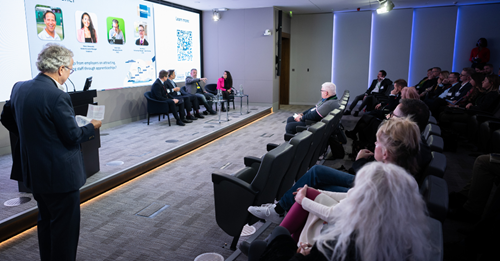
What are the learnings from employers on attracting, engaging and retaining staff through apprenticeships?
Ending the day, a panel of sales professionals, who all have a connection to sales apprenticeships, discussed their opinions on apprenticeships. The panel included Jason Holt, Co-Founder of Metaverse Learning Metaverse, Sherry Nematalla, Global Accounts Manager at Vodafone, Kevin Kelly, Managing Director at PACE, and Pete Milsom, Partnerships Manager – Apprenticeships at UCAS.
A few topics the panel discussed were:
- How to make an apprenticeship “cool” and attractive in small businesses
- Is the term “apprenticeship” causing confusion regarding age eligibility?
- What employers can do to make apprenticeships appear more attractive
- How far ahead are companies planning their workforce’s requirements and to what extent are apprenticeships featured in those plans?
- When the best times to look for new talents are
- How to properly use the government levy
An important lesson from this discussion, which closely echoed that of previous discussions, was that the promotion of apprenticeships through word of mouth was considered reliable and trustworthy, as well as the need for more understanding about what an apprenticeship is.
As the Q&A continued, a comment from the audience came regarding an individual who participated in Consalia’s Level 7 apprenticeship through their own means.
“I’m so grateful that I did this, and I wonder on the other hand, isn’t an apprenticeship similar to a collaboration where you can get training externally which helps you? Because you’re not a burden on the business, you’re actually supporting them right? I felt I was contributing to the business whilst I was learning…”
The panel then discussed the apprenticeships in more detail regarding the 20% on-the-job learning, the responsibilities of both the student and their organisation and the overall knowledge businesses have of apprenticeships. Speaking specifically about the 20% on-the-job learning, Kevin Kelly commented:
“I don’t think they even know they can make a choice in my sector and in SMEs. I guarantee there are not many people who understand or know this. They are approached by training organisations that maybe would share that information…but that’s as much as they know because I had no knowledge of this two years ago."
"I don’t think we’ve informed the SME industry sector very well around this process if I'm being brutally honest… but I think a lot of that money that you give back to the government would probably still be with some of those SMEs if they had a choice”.
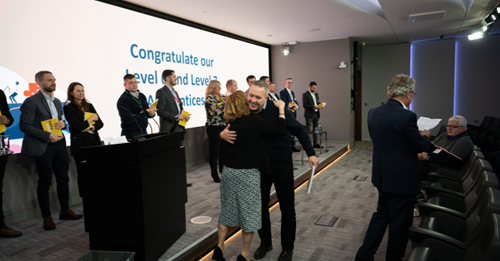
This year’s GST XVII was a great opportunity for all attendees and speakers to learn from each other in order to strengthen the sales industry and look to the future. Over the years the event has developed and continues to be a central meeting point for sales leaders to gather and share their thoughts, ideas and findings. With this year’s important topic and knowledgeable speakers, we are excited to see how individuals will put what they have learned from the day into practice.
